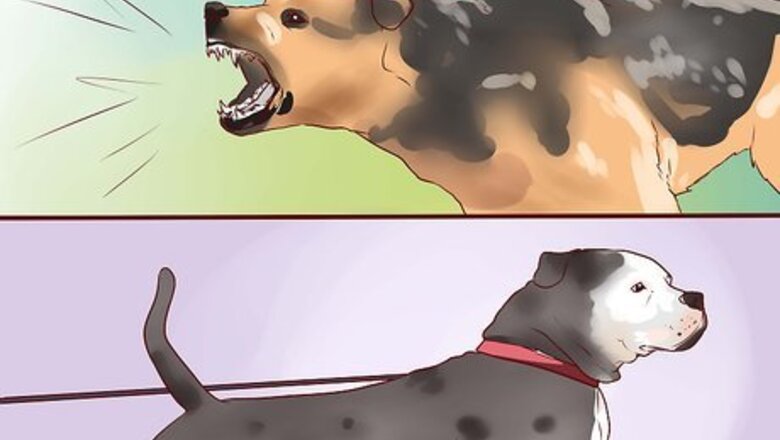
views
Preparing to Train Your Dog to Be a Guard Dog
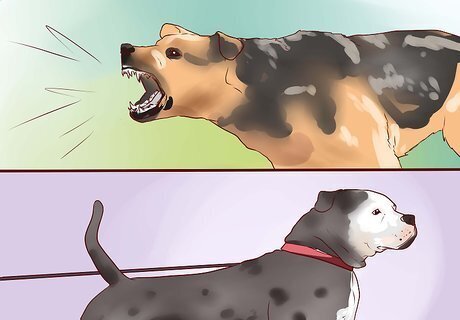
Recognize the difference between a guard dog and an attack dog. A guard dog is trained to alert its owner of the presence of a stranger or intruder through barking or growling. Guard dogs are not typically trained to attack on command or to act overly aggressive towards a stranger. Therefore, guard dogs generally do not make very good attack dogs. Attack dogs are often used by police and law enforcement. They are trained to attack on command and respond aggressively to potential threats or intruders. Most attack dogs are well trained and will not act in an aggressive way unless they are commanded to by their owner. Attack dogs that are not well trained, however, can attack without warning and pose a serious danger to humans and other animals. The average owner is unlikely to need an attack dog.
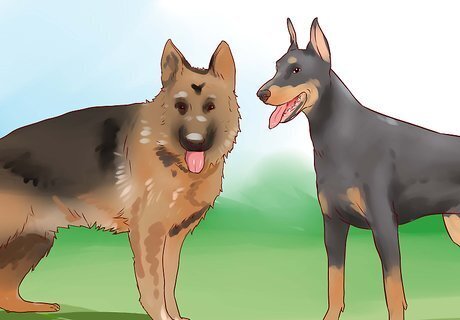
Determine if your dog’s breed is a typical guard dog breed. Though most dogs can be trained to be guard dogs, certain dog breeds are known to make good guard dogs. For example, smaller breeds such as Chow Chows, pugs, and Shar Pei’s have been known to be good guard dogs. Larger breeds, such as Doberman Pinschers, German Shepherd, and Akita also make excellent guard dogs. Certain breeds, such as German Shepherds and Doberman Pinschers, can be trained to be guard dogs as well as attack dogs. If you have a pure-bred dog that is not a typical guard dog breed, or if you have a mutt, it is still possible for you to train him to be an excellent guard dog. If he has the behavioral characteristics of a guard dog and is properly trained and socialized, then you could train him to guard and protect you.

Learn about the personality traits of an ideal guard dog. Contrary to popular belief, a good guard dog should not react out of fear or pure aggression. Generally, a good guard dog should be territorial and protective of his owner and his owner’s property, yet remain obedient to his owner’s commands. A good guard dog must be confident in himself and his surroundings. A confident dog is curious about a new person or a new area, and is not shy or timid around new people. Your dog may already have this trait inherently, but proper socialization can also instill confidence in a dog. A good guard dog is also assertive. This does not necessarily mean that he is overly aggressive or pushy. Rather, it means that he is comfortable with putting himself in a position that will allow him to get what he wants. It also means that he will be confident in approaching a new situation or person, rather than backing away. Sociability is another important characteristic of a good guard dog. A well-socialized guard dog will be able to recognize and be wary of a stranger in his owner’s presence, but will not attack or become overly aggressive towards that stranger. Good guard dogs must also be easily trainable. Chow chows can make good guard dogs because they are naturally suspicious of strangers, but tend to be very independent and not easy to train. Loyal dogs make great guard dogs. The more loyal your dog is to you, the more likely he will want to defend and protect you. German shepherds are known to be a very loyal breed. EXPERT TIP Sheri Williams Sheri Williams Certified Dog Trainer Sheri Williams is a Certified Dog Trainer and Behaviorist and the Owner of sheriwilliams.com, a business that specializes in teaching veterans how to turn their dogs into service dogs or emotional support animals to assist with PTSD. Based in the Los Angeles, California metro area, Sheri has over 20 years of dog training experience and also runs a general dog training practice specializing in rehabilitating dogs through positive reinforcement training techniques. She is certified by The Animal Behavior and Training Association. Sheri Williams Sheri Williams Certified Dog Trainer Become an expert through in-person training. To become skilled at dog training, it's helpful to do an in-person training program rather than learning online. Real-life experience working directly with the dogs and trainers is invaluable for picking up the nuances of dog behavior and training techniques.

Socialize your dog as a puppy. Proper socialization is essential to training your dog to be a good guard dog. When your dog is well socialized, he will be comfortable in his normal environment. He will also be less fearful and more relaxed—important characteristics of a good guard dog—but will still retain a healthy dose of suspicion of unfamiliar and potentially dangerous situations. The best time to socialize a puppy is when he is between three and twelve weeks of age. Beyond twelve weeks of age, puppies become increasingly more cautious of new situations and therefore become much more difficult to socialize. During the socialization period, you should get your puppy comfortable with meeting new people and interacting in new environments. It can be a huge task to socialize your puppy, so it may be easier to break socialization into small parts and expose him to situations over time at his comfort level. Reward your puppy with plenty of positive reinforcement (e.g., petting, treats, extra play time) each time that he has a good socialization experience. Puppy classes are an excellent way to socialize your puppy. Keep in mind that your puppy should be up-to-date on his vaccinations and deworming treatment to keep him healthy and free of disease during the entirety of the training program. If your dog is an adult and you have already trained and socialized him, then he should be well on his way to becoming a good guard dog.
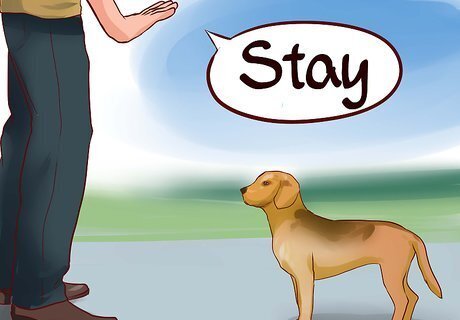
Ensure your dog can follow basic obedience commands. Before you begin guard dog training, your dog should already be able to obey basic commands like “stay,” “sit” and “down.” Having these basic obedience skills will ensure your dog can build up to learning defensive techniques like alert barking and standing guard. You can teach these commands to your dog on your own. Alternatively, you can sign your dog up for an obedience training class.
Training Your Dog to Alert Bark
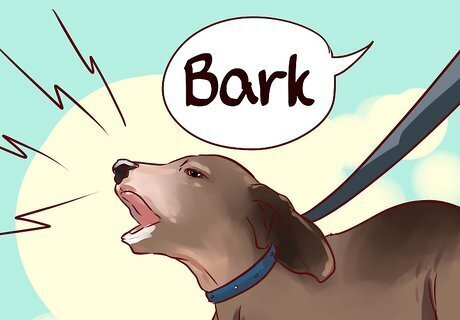
Choose a trigger word. To train your dog to alert you when a stranger is at the door or on your property, you first need to establish a trigger word to act as a command. You can use “bark” as a command. Some owners prefer using a word other than “bark” (e.g., “speak”) so that the command is not so obvious to others around you. Once you choose your “bark” trigger word, say it with the same level of enthusiasm each time you give your dog this command. Use the same trigger word every time you command your dog to bark.
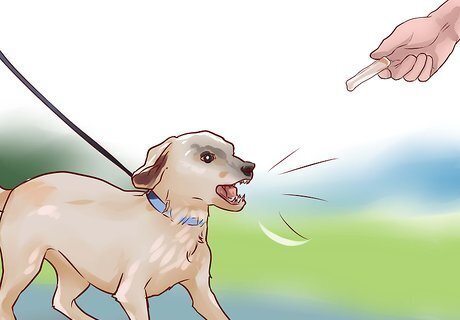
Practice the command. Most dogs are natural barkers and do not need a command to bark at the sound of someone approaching or a sudden noise. The key here is to get your dog to bark on command. To begin, tie your dog up on his leash to a kitchen table leg or on a spot on your fence in your backyard. Hold a treat out to your dog as you back away from him, and then move out of his field of vision. As soon as your dog makes a sound, like a whine or a bark, run back to him and praise him with “good bark” or “good [trigger word].” Give him his treat immediately. After repeating this several times, your dog should start to connect your praise of his bark with a reward. Once your dog gets comfortable with the bark command while in the same area or spot, move him to different areas in your yard and in your house. You should also test his response to the command when you are walking him or playing together in a public place.
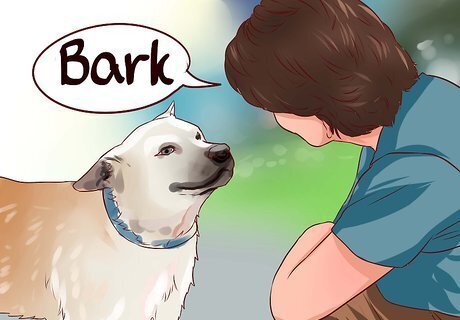
Be firm and clear with the command. Consistency and practice are key to getting this command to stick. If you want to test his response during a walk, stop walking him and look him directly in the eye. Then, say an enthusiastic “bark” command. If he looks confused or hesitates at your command, hold out the treat and repeat the command. Ideally, your dog should bark only once when you give him the command. However, your dog may want to continue to barking once you’ve gotten him started. Do not reward him if he barks continuously. Wait for him to quiet down before giving him the command again.
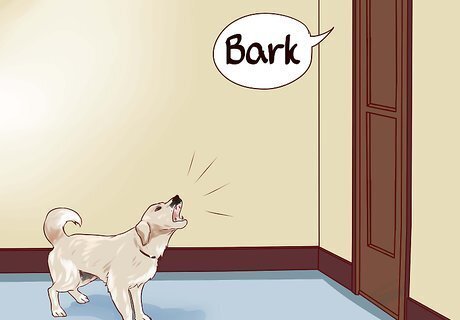
Create a mock scenario. To challenge your dog’s understanding of the “bark” command, keep your dog inside your home and step outside your front door. Once you are outside, ring the doorbell and give your dog the “bark” command. Reward him with a treat when he barks once at your command. Next, knock on the front door and give the “bark” command. Reward him with a treat if he responds correctly to your command. If possible, run through this scenario in the evening when it is dark outside. You will likely want your dog to warn you of someone at the door at night, so it will be important for him to understand that he should respond to the “bark” command during day as well as at night. Practice the “bark” command in short intervals. After three to four repetitions, give your dog a break and let him do something else for about 45 minutes. After this break, practice the “bark” command several more times. The goal is to avoid overtraining so that your dog does not become bored or frustrated during his training sessions.
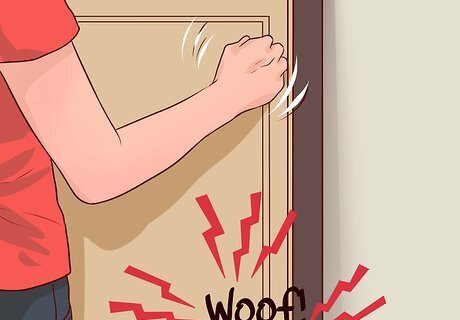
Ask a family member to test your dog’s alert bark. Once your dog appears comfortable with the “bark” command with you, focus on getting him to bark at someone other than you. Have a family member step outside and knock or ring the bell. Stay inside and give your dog the bark command. Reward each bark with a treat. This will reinforce his protective instinct to bark at someone (or something) unfamiliar. Continue to practice the “bark” command with a family member, rewarding your dog each time he barks at the sound of the bell or a knock at the door. He should eventually start to associate the doorbell or a knock with a bark and bark once at the sound. Over time, you want to try to train your dog to bark at the sound of the doorbell or a knock at the door, rather than at your command.
Teaching Your Dog the ‘Quiet’ Command
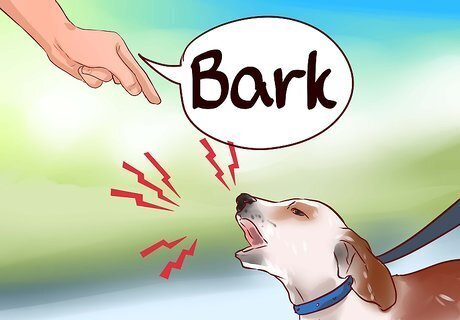
Command your dog to bark. Now that your dog has learned how to bark on cue, the next is to command him to stop barking. In fact, teaching your dog the “bark” command is considered to be a practical first step to teaching him to the “quiet” command. Being able to command your dog to bark and stop barking on cue will help him be a good guard dog. As before, reward him with a treat when he responds appropriately to your “bark” command.
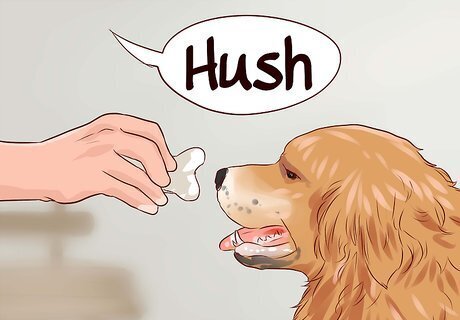
Command your dog to stop barking. Ring your doorbell. When your dog starts barking in response to the ring, put a tasty treat in front of his nose. As soon as your dog stops barking to sniff the treat, say “thank you” or “hush.” Immediately follow your verbal command with a treat. Do not yell or use a loud voice when you give your verbal command. Your loud voice may add to your dog feeling alarmed and may encourage him to bark even more. Do not use “shut up” or “no” as verbal commands to get your dog to be quiet, since they can have a negative connotation.
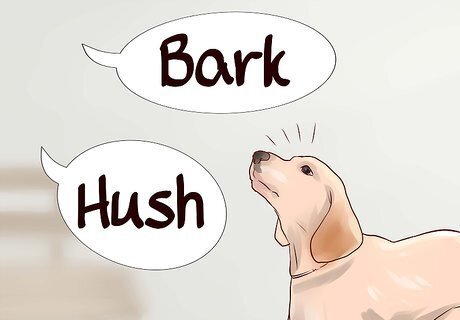
Alternate between the “bark” and “quiet” commands. Alternating between the two commands will allow you to have better control over your dog’s barking, which is very important to training your dog to become a good guard dog. You can have fun with this by varying how many times you say “bark” before giving him the command to be quiet. Your dog will probably see this as a game, which could make the training session much more enjoyable for the both of you.
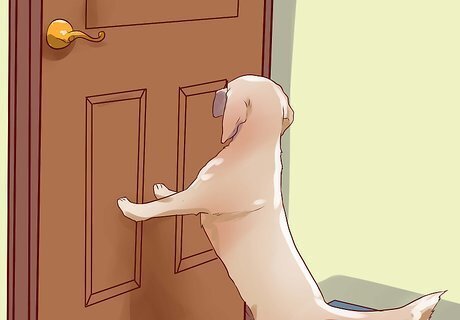
Encourage your dog to bark when a stranger arrives. Encourage your dog to bark if the doorbell rings, even if you know who is at the door. He may not know who is on the other side, so you want to encourage his protective instinct to bark and alert you of something unfamiliar to him. When you get to the door, give him the “quiet” command and immediately reward him with a treat when he stops barking. Do not encourage him to bark if you meet a friendly or neutral stranger when you take him outside for a walk.
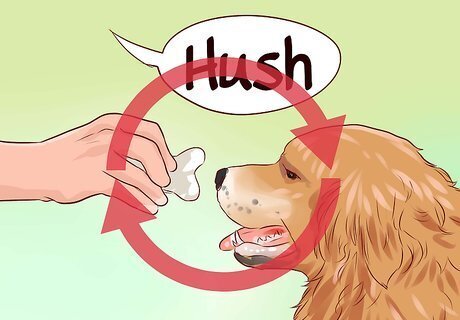
Practice the “quiet” command repeatedly. As with all training activities, repetition is necessary to teach your dog to respond appropriately to your command every time that you give it. Practice this command in short intervals and reward him with a treat each time that he gets it right.

















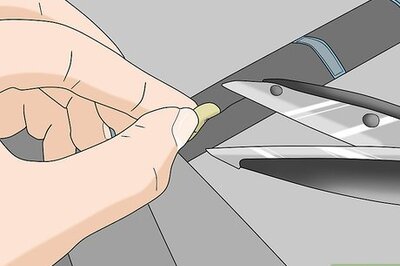


Comments
0 comment